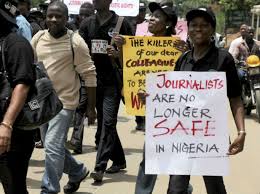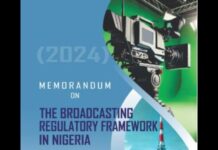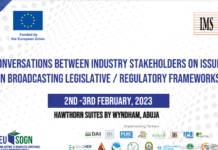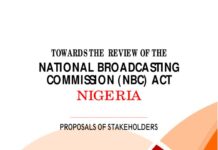
Legislations that Criminalize Publications and Broadcasting
Under this heading we have the legislations which criminalize certain publications and prescribe punishments of monetary fines or terms of imprisonment or both. In this category are the Criminal Code Act Cap C 38 Laws of the Federation of Nigeria (LFN), the Penal Code Act Cap P3 LFN 2004, the Official Secrets Act, Cap 03 LFN, 2004, the Newspapers.
Newspapers Laws of selected states of the Federation and the Obscene Publications Act
(a) Criminal Code Act (i) Chapter 7 which runs from sections 50 to 60 deals with sedition and the importation of seditious or undesirable publication.
Section 51makes it an offence to, inter-alia, utter seditious words, print, publish, sell, offer for sale, distribute, or reproduce or import any seditious publication and prescribes imprisonment of 2 years or a fine of N200 or both and for a subsequent offence, imprisonment for 3 years and forfeiture of any seditious publication to the state. It is also an offence to publish false news (s.59) and to publish defamatory matter against any foreign sovereignty.
(ii) Chapter 33 which is made up of sections 373 to 381 makes it a misdemeanour to publish any defamatory matter and prescribes a term of imprisonment of 1 year. Where the publisher knows the publication to be false he is liable to imprisonment for 2 years (section 375). However, that section is subject to the other provisions in that chapter 33, e.g. publication is not an offence if at the time it is made is for public benefit and the defamatory matter is true. The chapter goes on to make provisions for cases where certain publications may be absolutely or conditionally privileged.
Note: The Criminal Code Act is the major legislation on criminal matters. Although it is a federal legislation, it has been enacted by all the states in southern Nigeria as Criminal Code Law.
Penal Code Act
The Act which prescribes sedition as an offence, also listed provisions in sections 416–421 for offences relating to publication either by words, spoken or written, or by mechanical means which are capable of inciting disaffection to the government (s.416); inciting hatred between classes (S.417); false news with intent to cause offence against public peace (S.418) and possession of seditious articles (S.419); power to prohibit importation of publications (S.420) and punishment for importation of prohibited publication (S.421).
Various terms of imprisonment extending to 7 years or fine or both are prescribed under the chapter. The Penal Code Act is the equivalent of the Criminal Code Act in the northern states of Nigeria.
Official Secrets Act
This Federal Legislation restricts access of journalists and other persons to official information. It makes it an offence on the part of any person to transmit any classified matter to a person to whom it is not authorized on behalf of the government to transmit it or who obtains, reproduces or retains any classified matter which he is not authorized on behalf of the government to obtain, reproduce or retain, as the case may be (see section 1).
Section 9 of the Act defines “classified matter” as “any information or thing which, under any system of security classification from time to time in use by or by any branch of the government, is not to be disclosed to the public and of which the disclosure to the public would be prejudicial to the security of Nigeria.”
Newspapers (Amendment) Act/Newspapers Laws
(i) This Federal Legislation is meant to be regulatory in nature, but it also makes publication of certain statements in a Newspaper an offence (section 4(1)). Some states of the Federation have a similar provision of the offence of publication of false statements in Newspapers. Some of these states are Edo and Delta States created from the old Bendel State (section 28 of Newspapers Law of Bendel State); Cross River and Akwa Ibom states created from the old Cross-River State (sections 16 & 17 Newspapers Law of Cross River State); Lagos State (section 21 Newspaper Law of Lagos State); The South Eastern States of Nigeria (see Newspaper Law, Laws of the South Eastern States of Nigeria).
Section 21 (1) of the Newspapers Law of Lagos State Cap N2 Laws of Lagos State, 2003 states as follows:—
“21(1) Any person who authorizes for publication, publishes, reproduces or circulates for sale in a Newspaper any statement, rumour or report knowing or having reason to believe that such statement, rumour or report is false shall be guilty of an offence and liable on conviction to a fine of N400 or to imprisonment for a term of 1 year.”
(ii) Aside from creating the offence referred to supra, this Federal Legislation generally sets out to regulate the operation of Newspapers. Thus it makes provision for the establishment by every Nigerian Newspaper of an office in the Federal Capital Territory; Appointment of Editor of a Newspaper to be notified to the Minister; delivery of signed copy of Newspaper to the Minister and publication of name of its editor in the Newspaper.
(iii) In Lagos State, the Newspapers Law CAP N2 (supra) makes extensive provisions in 27 sections for the Registration of Newspapers and for other purposes in connection with Newspapers.
Obscene Publications Act
This is also a Federal Legislation which seeks to prohibit publication or distribution of any article or object deemed to be obscene and provides a fine not exceeding £200 or imprisonment not exceeding 3 years or both (section 4 (1)). The test of obscenity is provided in section 3(1).
The National Broadcasting Commission Act
This is a Federal Legislation which sets out amongst other things to regulate and control the Broadcasting Industry and set policies with respect thereto. Section 1 of the Act establishes the National Broadcasting Commission (NBC), the regulatory authority, and section 2 lists the extensive powers of the Commission ranging from receiving, processing and considering applications for the establishment or ownership or operation of Radio and Television stations.
Section 2(2) prohibits transmission by cable, Television, Radio Satellite or any other medium of Broadcast except in accordance with the Act. Furthermore, the Act provides for the procedure for obtaining licenses and the granting of licenses as well as terms of a license and of renewal thereof. The Commission is imbued with the power to enforce the National Broadcasting Code made pursuant to the Act.
The NBC is viewed by many as lacking in independence as it is directly under the control of the Minister of Information and Communications as well as the President. It has been repeatedly accused of being quick to muzzle privately owned broadcast stations with little or no justification while turning a blind eye when government owned stations violate the provisions of the Broadcasting Code, particularly during electioneering periods.
Nigeria Press Council Act
(i) This is a Federal Legislation provides for the establishment of the Nigerian Press Council “to promote high professional standards for the Nigerian press, and deal with complaints emanating from members of the public about the conduct of journalists … and for other matters connected therewith.”
(ii) The Council is also charged with monitoring the activities of the press with a view to ensuring compliance with the code of professional and Ethical Conduct of the Nigerian Union of Journalists (sections 3 and 9)
Electoral Act
(i) Although this legislation is not strictly a one in respect of the press, but to regulate the conduct of federal, state and Area Council elections and for related matters, there are provisions therein for rules and regulations in the conduct of the press (print and electric media) regarding campaigns for elections by political parties and candidates.
(ii) Thus in sections 100 and 101 of the Act, provisions are made regarding media time and coverage to be allocated among the political parties and candidates, the use of public media, and prohibition of broadcast at certain hours preceding the election and on election day
(iii) The Act makes a contravention of these provisions an offence, and prescribes monetary fines on conviction.
Printing Presses Regulation Act/Printing Presses Regulation Law
(i) The Printing Presses (Regulations) Act is a Federal Act for the regulation of printing presses and of books and Newspapers printed in Nigeria.
(ii) There are corresponding Printing Press Regulation Laws in the States of the South-West of Nigeria. In Lagos State, it is the Printing Presses Regulations Law, Cap P12 Laws of Lagos State 2003. it is a short legislation of five (5) sections with S.5 giving the Governor the power to make regulations, inter alia, generally for carrying out the purposes of the law into effect. The subsidiary legislation made under S.5 contains general provisions relating to the operation of printing presses in the state.
Freedom of Information Act
(i) The Freedom of Information Act which was signed into law in 2011 is one of the most revolutionary pieces of legislation ever made in the area of access to information in Nigeria.
(ii) It came about after years of constant and persistent but aggressive agitation and campaign by non-governmental organisations and media groups spear-headed by the Media Rights Agenda, a Lagos-based NGO with bias for freedom and rights of the press. In a country where its leaders have an uncanny reputation for keeping public information from its citizenry, it was a famous victory indeed.
(iii) The Act makes records and information more freely available, provides for public access to public records and information, to protect public records and information to the extent consistent with the public interest and the protection of personal privacy, to protect serving public officers from adverse consequences for disclosing certain kinds of official information without authorization and establish procedures for the achievement of those purposes and for related matters.
(iv) Perhaps to remove any doubt about its intention to see that the Act achieves its purpose, the Attorney-General has rolled out guidelines to aid in the implementation of the Act.
(v) However, being still relatively new, the efficacy of the Act to achieve its aim is yet to be tested. It is still a laudable effort on the part of the Government.
The Rights of Journalists
Although now expressly entrenched in the fundamental law i.e. the Constitution, the right to freedom of expression like the other fundamental rights are not absolute and are therefore subject from time to time to a host of exceptions and qualifications mostly from the government in the interest of defence, public safety, public order, public health or for the purpose of protecting the rights of other persons. See: section 45(1) of the 1999 Constitution, Cap C1 of the LFN, 2004. It has been argued that the right to freedom of expression is one granted to all citizens and not restricted to be enjoyed only by journalists, as such.
Legal Constraints on Press Freedom
We have examined earlier the legal constraints on press freedom stemming from the restrictions and derogations on the fundamental right to freedom of expression contained in the Constitution itself, as well as the other legislations already mentioned and from the activities of the regulatory bodies. Other existing legal constraints to press freedom can be found in the Nigeria Press Council Act Cap N128 LFN, 2004. This decree established a council most of which members are appointed by the government with a mandate to supervise the conduct, work, administration, registration and deregistration of journalists.
However, with democracy taking deeper root in Nigeria, especially since the commencement of the current experiment in democracy in 1999, there has been a noticeable improvement in the area of respect for the rights of journalists and the right to freedom of expression and the press. There is now less incidence of arbitrary arrests and detentions (in some cases killings) of journalists which characterised the hey-days of military dictatorship in Nigeria.
In addition, the judiciary is becoming more emboldened in its condemnation and punishment of infractions of the right to freedom of expression and the press through their judicial pronouncements. See: Punch Nigeria Ltd v. A.G. Federation and Jimoh v. A.G. Federation.
Credit: Media Foundation for West Africa















